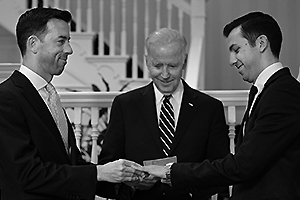
Bishop Thomas Paprocki recently pointed to a crisis in the Church with his article “Imagining a Heretical Cardinal.” The learned canon lawyer masterfully laid out his case by quoting the positions of a “hypothetical” Cardinal (taken from an article written by San Diego Cardinal Robert McElroy, without mentioning his name). It does not take much imagination to apply the same principles the bishop identifies to other figures, starting with imagining a “heretical” American president.
Of course, this application should be used judiciously lest it becomes a witch hunt accusing everyone of heresy. But the bishop of Springfield, Ill., carefully showed how—on specific questions—the Cardinal’s heterodox stands about sexual matters and the Holy Eucharist put him outside the communion of the Church, among the “separated brethren,” i.e., this made him a heretic.
Moreover, he cited Canon Law showing how subscribing to these positions separates a person from the Faith, with no need for an official declaration of excommunication. It is automatic. The offender removes himself from the Church automatically by holding the condemned positions, latae sententiae, to use the technical terminology. He becomes a heretic and is excommunicated by the simple fact that he “rejects essential truths of ‘the faith which was once for all delivered to the saints.’” (Jude 1:3).
Canonically, neither the Cardinal nor his numerous defenders have rebutted the bishop’s charge. They have sought to deflect the attack by questioning Church teaching on sexual matters or attempting to revive the condemned “principle of the fundamental option,” that the love of God trumps all—even long-defined dogmas and morals, and the Canon Law by which the Church is governed. Canonically, however, the Cardinal remains, as charged, a heretic.
Bishop Paprocki’s refreshing statement brings definition and clarity not only to the McElroy case, but to the wider debate. The willingness to call a spade a spade and a heretic a heretic has long been lacking. His bold invitation to get this discussion “out in the open” changes the dynamic of the present dispute. Catholics can now talk in precise terms about such important matters, thanks to a learned bishop who was unafraid of opening up the debate by using the forbidden H-word.
And we might add that, as in the case of the wayward Cardinal, the proper term also needs to be applied to influential public figures who take advantage of their Catholic identity to destroy the moral order, confuse the faithful, and offend God.
Help Remove Jesus Bath Mat on Amazon
Because of the moral harm done to millions and the common good of the nation, it has become urgent to imagine a heretical president. The president’s case would differ somewhat from the Cardinal’s since it does not deal with the Eucharist. The bishop’s clear canonical outline about how to make this determination, however, is the same.
The bishop defines heresy as “the obstinate denial or obstinate doubt after the reception of baptism of some truth which is to be believed by divine and Catholic faith.” (Canon 751 of the Code of Canon Law)
With words and actions, the president denies the defined truth about abortion. The Church affirms that every procured abortion is intrinsically evil. The Catechism of the Catholic Church states that this Church teaching “has not changed and remains unchangeable” since the first century. Canon Law further sanctions abortion and those who facilitate it.
Joe Biden has—both before being elected president and insistently since taking office—held positions regarding abortion, homosexuality, and other major moral issues that are contrary to Church teaching. He has made it his mission to vastly expand access to abortion and the distribution of abortion pills with the passion of a pagan Caesar persecuting Christians. And has hidden behind his Catholic identity and misrepresented Church teaching when challenged.
Satanic Christ Porn-blasphemy at Walmart — Sign Petition
The president has had the advantage of being warned of his errors by faithful American bishops. He can claim no ignorance. As Bishop Paprocki skillfully demonstrated, however, such warnings have gone unheeded. The truth needs to be said. Anyone who denies Church teaching on the intrinsic evil of procured abortion separates himself automatically from the communion of the Church. Like the Cardinal, canonically imagining a heretical president must be on the table.
Such a distinction would seem irrelevant in a political order that recognizes no official church. “Heretical president” seems to have no place in a secular society. And whether he is a heretic would seem to make no practical difference.
What public offices and the people who occupy them promote, however, is important in a postmodern world without meaning. Indeed, the Church still wields immense influence on the public despite the great crisis inside her.
The president and his wife certainly know the political value of appearing Catholic in public. Mrs. Biden, for example, recently appeared at a function in Africa, discussing contraception while wearing a Catholic rosary around her neck. Mr. Biden loses no opportunity to present himself as a Catholic.
How Panera’s Socialist Bread Ruined Company
What the Church needs now more than ever is clarity. As Bishop Paprocki said, the time for private conversations is over. He provides an excellent template for bringing matters of great importance out in the open.
Imagining a heretical president clears the air around the debate. It dispels the theatrics surrounding “Catholic” figures that betray Church teaching. Frustrating every attempt to muddy the waters, the Paprocki template makes it clear that, unless they repent, the president and others like him must be treated as heretics separated from the Church. They can no longer use their Catholic identity as cover to advance their progressive agendas.
Such agendas need to be seen for what they are—evil opinions that lead to the destruction of innocent human life and the perdition of many. For the sake of the faithful and the unborn, the heretics must be publicly denounced.
As appeared in The Catholic Thing, March 18, 2023


